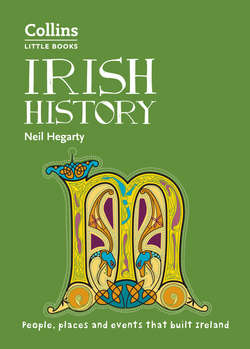Читать книгу Irish History: People, places and events that built Ireland - Neil Hegarty - Страница 14
ОглавлениеBefore Christianity
The prince who had enlisted the assistance of Agricola was one of many such leaders, for Ireland at this time was divided into a series of kingdoms or túatha, the borders of which fluctuated ceaselessly. The túatha did from time to time federate into larger entities, but these too were subject to continual change. Even the five historic provinces of Ulster, Munster, Leinster, Connacht, and Meath were by no means constant fixtures on the political scene. There was certainly no conception of a centralized state, and yet there was the sense of a collective identity. Significantly, the Irish word for a province was cúige, meaning a fifth, thus implying the presence or existence of a whole. In social and economic terms, these were intensely hierarchical societies: power flowed from the king through the scribes and poets – whose influence in an oral culture was considerable – down to the landless serfs. Laws were pervasive and byzantine, governing every aspect of life, and so, in spite of political turmoil and competition, life in Ireland was inherently deeply stable and organized. This was a society in which each individual knew their place.
